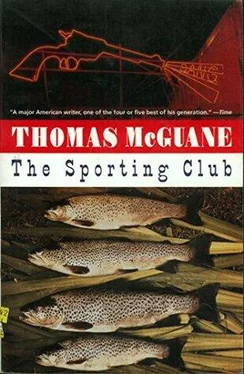He stopped outside at the edge of the compound. There was now a flag on the tall flagpole, standing out from its distant top like a new postage stamp. Behind the screens of the Bug House the small bandstand was visible with its chairs, its piano, its music stands and its shadowy, disused jukebox. The grass all around was brown in the exposure. From behind the main lodge came the same children’s voices, the sound of chopping, and then heavy hands seized his ears. A falsetto cry came from behind: “Mumma! Mumma!” It was Stanton. He made Quinn guess over and over what day it was. Quinn couldn’t do it. It was the day the Mackinac Bridge was to be dedicated.
“I don’t want to go,” said Quinn.
“I have my boat there.”
“I don’t want to go and I won’t go.”
“You’re going.”
“What’ll we do? No, really, I don’t want to go.”
“This is an important day in our state’s history you god damned loser and you’re going to go.”
“You and Janey go. Take pictures so that we can all pore over them ardently at some unspecified later date.”
“If you don’t go I’ll spend considerable time and money to make your life a living hell.”
“I’m telling you, Vernor. It isn’t going to be the same this year. There is going to be no clowning.”
Stanton looked at him. “I don’t believe you,” he said, looking.
The view of the water from the Mackinac dock was blocked at intervals by the tall steamers, all cleanly painted in gun-metal gray and white; and the glass panes of the great cabins and staterooms picked up the light of the very cold blue straits beyond. They walked the length of the dock, and the tall pilings next to them that were faced with strips of fire hose heaved and took up the slow shock of the steamers’ movement. The private boats were moored beyond the steamers. The three of them stopped before a tall Matthews yacht that was heavily equipped with Rybovitch blue-water fishing modifications: outriggers, a tuna tower, gin pole and harpoon stand. The boat was covered with a fitted duck tarpaulin drawn tight as a trampoline at its grommets. The tarp stretched between the transom and the flying bridge; the radio direction finder was covered by a small fly of canvas that matched the tarpaulin. It was Stanton’s boat and the name was on the transom in brass: Lusitania. Underneath that, the home port: Ponce, Puerto Rico. Quinn was thinking of the last time he had seen Stanton, helplessly and pathetically out of his mind in front of the Detroit Athletic Club. Afterwards, Stanton had headed south and this was how he’d gone.
They left the dock, passed a row of green highway department trucks and walked until they were at the thronged middle of Mackinac City with its weathered concrete and false territorial buildings. Stanton led and Quinn followed Janey through streets full of people who had come for the bridge dedication. The bridge itself was cordoned off by the state police. The three were balked; then Stanton led a retreat without explanation, downtown again to a dry-cleaning establishment. When he came out, he had three paper tags that he pinned to their chests; the tags read PRESS ONLY. They looked at each others’ tags unconvinced.
Squinting past the great concrete fan of the entrance and past the toll gates, Quinn could see the bridge climbing, its towers and cables strewn against the sky, holding the vast and absurd booby trap together. Where the approach was closed off, black limousines with tinted windows began the ascent to the bridge’s crown, and from behind those windows the myriad muted faces of nabobs gazed at the riffraff. These limousines were followed by a small parade of open convertibles, each with a queen seated on the furled top. There was a peach queen, a gasket queen, a celery queen, a lumber queen and finally, a slender, dark girl passed waving to the crowd, the smoked pickerel queen. A number of people tried to follow the queens onto the bridge. They were stopped by the police and howled in near-demented rage. Quinn, Stanton and Janey moved on to the entrance as though to walk straight through. A trooper stepped sideways into their path and Stanton said, “ Detroit Free Press, officer. Will you get the hell out of our way, officer?” They walked through the unoccupied toll gates and onto the bridge where the concrete apron fell away to open grating through which the water of the straits was visible.
The bridge rose away in front of them, up between the two great towers that slung cables thicker than trees; and under his feet Quinn saw the dark water ticked with whitecaps fade to solid blue as they climbed. At first he saw nothing ahead except the smooth, ascending grate surface of the bridge. But after a short time, the dedication party was visible, its flags, buses, limousines and platforms gathered between towers like a distant hill town. Someone was talking over a loudspeaker, the voice indistinct on the wind. A lake freighter passing under the bridge, tremendously diminished beneath them, poured smoke from its oval stack that you could smell as it came up through the grating. As they went, not talking, figures began to resolve themselves out of the cluster between the towers. They approached and saw the dedication party, a crowd of perhaps a hundred. On the platform a man was making a speech in Canadian French into a wall of smiling, upright, uncomprehending Michigan burghers who smiled at him while they talked to each other. The speaker’s hair was tossing and the sheaf of papers he held rustled uncontrollably in his hand. When his speech began to stumble, he looked down at this sheaf and his eyes widened with real ferocity.
Stanton beckoned. He was standing next to a bus designated STATE LEGISLATURE over its windshield. It was surrounded by parked limousines. Beyond the bus there was nothing but sky and lake. They followed Stanton as he pushed the folding door and climbed in. It was quiet and pleasant inside. They were out of the wind and no longer had to shout to each other. The French Canadian was silenced on his platform. His lengthy printed speech whirred decoratively in his hand. His curious mouth made interesting shapes in the air like a cooky cutter. And the sun shone hard upon everything. Quinn could see down the far slope of the bridge to the town of St. Ignace and beyond to the forests of the Upper Peninsula. Then Stanton found the liquor and the box lunches and they sat down. Quinn was hungry. Janey asked for the first time if they could go home now please, that is back to the club please, she didn’t, if no one minded, want to go to jail. She was ignored by Stanton, and Quinn didn’t know what to say to her. The players can’t be expected to talk to the spectators.
“Have you served your country?” Stanton asked, indicating Quinn with the point of his sandwich.
“No,” Quinn said, “I take, take, take and never give.”
“Never been in the army?” Stanton knew he hadn’t.
“No, have you?” Quinn knew that Stanton had been, of course. But it was expected that he should let Stanton rehearse this obsession.
“Just a little. I was found unfit for general consumption. Whenever I was in the barracks with a crowd of soldiers, my blood pressure climbed so high it distorted my vision. They had to let me go. Military hearts were broken. I couldn’t see, Mr. Quinn, I couldn’t see.”
They tried to talk about other things, but Stanton smothered any incipient conversation not related to the trial he seemed to be conducting.
“I think they’re starting to move,” said Janey. She was looking out of the back of the bus. Quinn tried to see. “Wait, he’s going on with the speech. This is our chance.”
“No,” said Stanton. Quinn wanted to get out too. He would even have agreed to run for it; but at the same time — and this is where he began to feel it — he recognized that there was something to be lost or recorded depending upon who first moved to escape. So he vacillated between numbing himself to their peril and searching the group outside for signs of restiveness. Looking at those faces beyond the window, he thought of stampede. “Why don’t we bust open some of these other lunches?” he said.
Читать дальше












